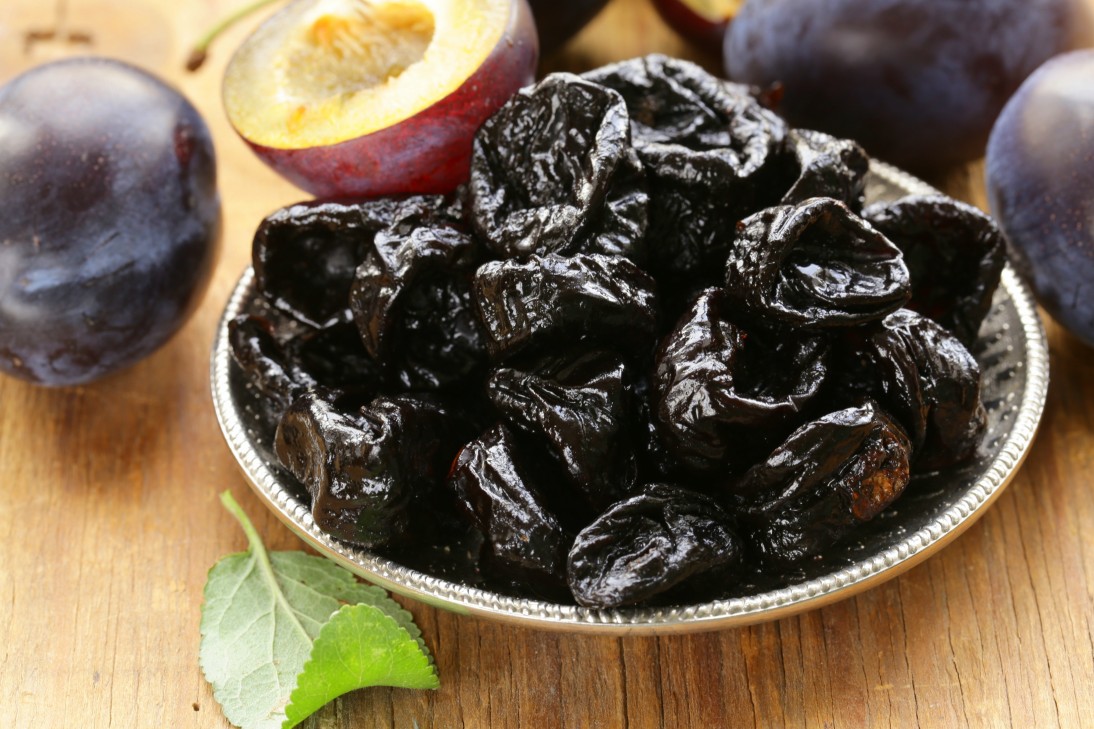Eating prunes always has been regarded as a way to ensure you stay regular. Now a new study shows five or six prunes a day also can cut your risk of heart disease.
The study found that a steady daily consumption of prunes, which are dried plums, over six months boosts cholesterol levels, lowers inflammation and improves antioxidant capacities. Those effects combined help lower heart disease risks and promote general good health.
Only women took part in the study and the benefits apply particularly to women who are older.
The study, conducted by researchers at San Diego State University and funded partly by the California Prune Board, built on earlier research that found that prunes contain ingredients that have shown to have anti-inflammatory and antioxidant properties.
Its objective was to advance these studies and to find out whether eating dried plums also cuts the risks for cardiovascular disease in women who are postmenopausal. The researchers particularly examined the effects on cholesterol, anti-oxidation, and inflammation in those women who ate prunes on a daily basis.
How the study was conducted
In the study, published in the Journal of Medicinal Food, 48 women who were healthy and post-menopausal were split into three groups. The first group ate no prunes, another group ate 50g of prunes a day, or about five to six prunes, and the third group ate 100g of prunes a day, or about 10 prunes.
The other foods that the women ate and the lifestyle that they followed remained similar for all groups during the study.
The women’s levels of indicators, such as inflammation and cholesterol, were noted at the start of the study. They were re-examined at the end to determine how much they had changed as a result of eating the prunes.
Raises ‘good’ cholesterol
They found that eating five or six prunes a day for six months raises the levels of “good” cholesterol in the body and, in doing so, is a factor in helping to cut the risk of heart disease.
The benefits from eating five or six prunes a day are roughly the same as those gained by eating twice as many each day, according to the findings.
The researchers found that the high-density lipoprotein (HDL) or “good” cholesterol improved significantly in the group that ate 50g of dried plums a day over the amount that was recorded when the study began.
This type of cholesterol is called good because it helps to remove the other types of cholesterol, known as low-density lipoprotein cholesterol (LDL) from the blood stream. High levels of LDL cholesterol can build up in the blood vessels, narrowing the passageways and allowing clots to form. The result can be a heart attack or stroke. The HDL cholesterol removes the LDL cholesterol from the blood stream; that is why it is known as “good” cholesterol.
The total amount of both forms of cholesterol in the group that ate 100g of prunes a day increased over the time period.
Inflammatory biomarkers and tumor necrosis also were markedly lower after six months of eating prunes in the group that ate 50g a day compared with the markers in the starting baseline.
In addition, total antioxidant capacity increased strongly in both groups, the research team found.
Prunes advance health
Looking at this study and studies conducted earlier by the university team as well as other research teams provides reliable evidence that eating prunes promotes health, says Shirin Hooshmand, lead researcher and professor at the School of Exercise and Nutritional Sciences at San Diego State University.
Cutting chronic inflammation and raising antioxidant capacity in the body is accompanied by a lower chance of cardiovascular disease, points out Mark Karen, a professor of nutrition at San Diego State University.
This study not only indicates that prunes might be a great way to cut inflammation and boost antioxidants, it also shows that eating prunes every day might improve levels of cholesterol in postmenopausal women, he adds.
Other research has shown that postmenopausal women who suffer from bones that are weak saw their bone density improve when they ate 50g of prunes a day.
Major cause of death
Cardiovascular disease remains the major cause of death worldwide. In the United States more than 650,000 people die from heart-related disease every year, accounting for one in every four deaths.
Health officials say a person dies every 36 seconds from cardiovascular disease in the United States.
Any foods or activities that can help combat heart disease, therefore, are considered beneficial for overall public health.
Now prunes have been added to the list of foods that are helpful in that regard.






